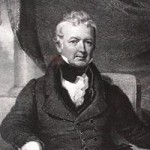William J. Gaston (for whom Gaston County, North Carolina was named) was a distinguished jurist, state legislator and US Congressman from North Carolina. Gaston served on the Supreme Court of North Carolina from 1883 until his death in 1884.
In the decision of the NC Supreme Court in State v. Manuel, 4 Devereaux & Battle 25-26 (N.C., 1838), Gaston concluded that free blacks were citizens saying:
All free persons born within the state are citizens of the state….
The term “citizen” as understood in our law, is precisely analogous to the term subject in common law, and the change of phrase has entirely resulted from the change of government. The sovereignty has been transferred from one man to the collective body of the people–and he who before was a “subject of the king” is now “a citizen of the state.”
This is important both in the invocation of the common law in the decision of a citizenship issue as well as the affirmation of the equivalence of “citizen” and “subject”.
Thus in North Carolina was affirmed the same principle that 6 years later appeared in the decision of Lynch v. Clarke in New York.





sometimes i wish the birther will do some real research & find out what the law of the us has been so they’ll stop deeiving themselves. u keep findingcase after case, jurist after jurist saying essentially the same thing what do they have vettel & collins & thats it of course misrepresnting the decisions in cases that everyone else agree the meaning of.
sometimes i just think they’re crazy !!!
They are either not being honest or have not done the research. I suggest the following reading material if they want to be honest:
James Kent, Commentaries on American Law, pg. 258 (1826); Joseph Story, A Familiar Exposition of the Constitution of the United States, pg. 167 (1842 ed.); Murray v. The Charming Betsey,, 6 U. S. 64 (1804); Inglis v. Sailors’ Snug Harbor, 3 Pet. 99 (1830) (Story concurring) and McCreery v. Somerville, 9 Wheat. 354 (1824); Lynch v. Clark, 3 N.Y.Leg.Obs. 236, 1 Sand. Ch. 583 (1844), Garder v. Ward, 2 Mass. 244 (1805), Kilham v. Ward 2 Mass. 236, 265 (1806), Ainslie v. Martin, 9 Mass. 454, 456, 457 (1813), State v. Manuel 4 Dev. & Bat. 20, 24-26 (1838); Zephaniah Swift, A system of the laws of the state of Connecticut: in six books, In Six Book, pg. 163,167 (1795), St. George Tucker, Blackstone Commentaries. Pg. ___ (1803), Nathon Dane, A general abridgment and digest of American law: with occasional notes and comments, pg. 686, (1824), William Rawle, A View of the Constitution of the United States, pg. 86 (1829) William Duer, Outlines of the Constitutional Jurisprudence of the United States, pg. 165 (1933), American Jurust and Law Magizene, pg. __ January, 1834, Bouvier Law Dictionary (1843), George Washington Paschal, The Constitution of the United States Defined and Carefully Annotated (1868), George Bancroft, History of the United States, from the Discovery of the American Continent: The American Revolution., pg. 439 (1866);), Amy v. Smith, 11 Ky. 326, 340 (Ky. 1822), Leake v. Gilchrist, 13 N.C. 73 (N.C. 1829), Jacksons v. Sanders, 2 Leigh 109 (1830), Barzizas v. Hopkins, 2 Randolph, 276 (1824); Crandall v. State, 10 Conn. 339 (1834), Trezevant v. Estate of Henry Osborn, 3 Brev. 29, 30 (S.C. 1812) and West v. West , 8 Paige. 433 (NY 1840).
Here in Portugal they were smarter. ,